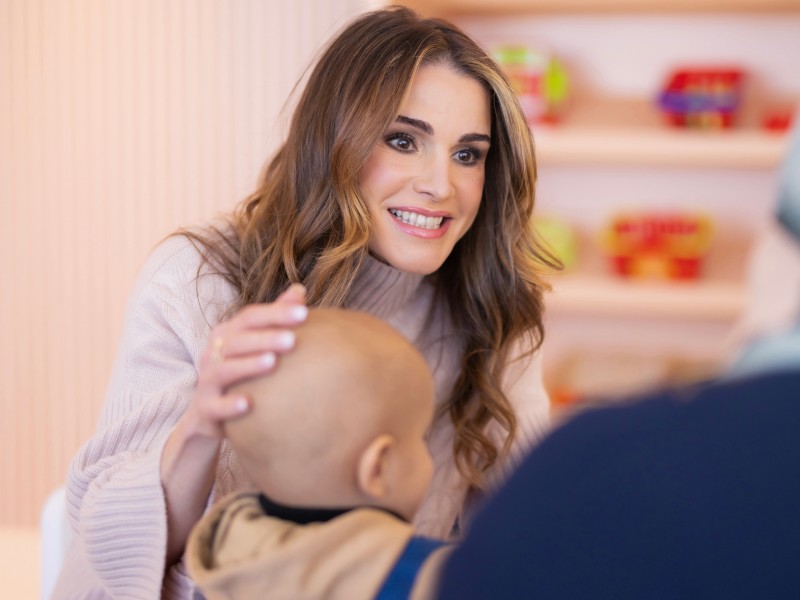Queen Rania’s Panel Discussion with Hillary Clinton and Filippo Grandi at CGI
HILLARY CLINTON: We are so excited for this panel because Queen Rania is a longtime friend and a participant in CGI, which means a great deal. She and her husband have been engaged in so many impactful partnerships and actions. And Filippo has the very difficult job as the UN High Commissioner for Refugees. So, let's jump right into this, because we've already heard a lot about what it means to be home or displaced from home. So, Queen Rania, I want you to reflect on the now more than 1 million Syrian refugees who call Jordan home. That accounts for nearly 7% of your country's entire population. And I must say that, your government, His Majesty, you and others, have proven to be extremely receptive and very supportive under really difficult circumstances, and we applaud you for that. But 11 years after the start of this massive influx into Jordan, what are some of the most important lessons that your country has learned about how to accommodate this population, and how to try to foster more inclusion for the refugee newcomers?
QUEEN RANIA: Well, first of all, thank you for having me here. And I'm particularly pleased to be here with you, and with one of Jordan’s most committed partners, both in his current position and his time at UNRWA, so thank you very much. You know, as you said, the last time I was here was six years ago. And it's interesting that six years later, we're still talking about the same crises, only compounded by a global pandemic and new global crises. So, times have gotten tougher, but so has Jordan's resolve. So today, we're still as committed to supporting and integrating refugees into our society. In fact, this year alone our government issued 62,000 work permits for Syrian refugees, and this is at a time when our own unemployment figures are in the double digits. So, you know, obviously we are affected by the challenges of increasing food and fuel prices, unemployment, overcrowded clinics and hospitals and schools. But, you know, it's interesting because according to a UNHCR survey that was done just three months ago, 96% of Jordanians remain sympathetic to the plight of refugees, which is really something to say about the value system in Jordan. And, you know, it’s just… we're not going to be turning against or turning away from people who are seeking our shelter or our protection. And that's really important for social integration. And it shows you that people inherently are good and they want to do the right thing, if nobody's telling them to be fearful of the other.
And as I said, it's important for the social integration because ultimately home is not a place. It is people, and it's very difficult to feel at home in a place where you feel unwelcome or unwanted. And we in Jordan also began to realize that -- we shifted our thinking about refugees. It’s not just a short term humanitarian crisis. It is, you know -- you require solutions that really recognize the long-term implications of displacement. So, it's actually a crisis of human development and needs a longer term view -- needs solutions that focus on growth, building resilience, sustainability, job creation, and it's not easy. I mean, are we there yet? Of course not. And because the best laid plans are not pandemic proof. And that's another challenge, is that we need to find ways to minimize the effects of the derailment of recovery plans in a world of constant disruption. Having said that, we do have some really good examples of partnerships that did work. So for example, my organization Jordan River partnered with IKEA, and through that partnership, we're able to support women and create sustainable solutions for the host country itself. Because the country has to feel like helping refugees doesn't come at its own cost, but actually helps the host countries. So, this partnership, you know, through it, we were able to create thousands of jobs for both Syrian and Jordanian women and integrate them into the labor force. And not only has this really transformed the lives of hundreds of families, but it's also been a powerful testament to the powerful impact of the intersection between a multinational company and a local NGO. We couldn't have done it without IKEA. And I hope this resonates with a lot of people in the global community. We can't really make it without committed partners from the outside world.
HILLARY CLINTON: Those are such important points. And in listening to you both, I really think we need to do more to lift up the example of Jordan because the kinds of lessons that Her Majesty was talking about don't happen by accident. It was intentional. You and your husband, your husband's government, everyone involved -- you made decisions that you are going to figure out how to be welcoming to these 1 million refugees in just one country. And you set about having a plan to do so. And I think it's also accurate that these refugees are in your towns and your cities. They're not in refugee camps for the large measure. Isn't that right, Your Majesty?
QUEEN RANIA: Absolutely. And, you know, I think it starts off with understanding that, you know, there isn't much of a decision to make. This is not – this is a global responsibility, is an obligation, not an option. And I think this is the problem with many countries.
You know, they think it's optional. So, I think, first of all that we really made the decision that we have to open our doors to the refugees. Like I said, we're looking at solutions that take a longer term view. It's really important that we merge the – join the humanitarian effort with the development effort, but that requires more funding. Not less. And sadly, a lot of pledges -- most pledges actually -- remain on paper. You know, refugee response programs, as you will attest, are chronically underfunded all over the world. For example, in Jordan, only 10% of our refugee plan has been funded so far, and resettlement targets are insufficiently low. I mean, you know, you have a few examples of wealthier countries that have done the right thing and have inspired us but unfortunately, amongst the vast majority, it's been a race to the bottom -- with the numbers that they are willing to let in are extremely low. And another thing we need to realize is that mass migration and forced displacement is going to be an annual norm. And so we need to be prepared for the next time this crisis happens, because it will. We need to be able to prepare, to respond faster, and sooner. That means that looking at refugees through the windshield, not through the rearview mirror. According to the World Bank, by the year 2050, upwards of 200 million people will be displaced just from climate change. So, we're talking about a global norm. And so it's up to us, do we want to have a world -- the choice is ours. Are we going to have a world that's chaotic and unstable with an uncontrolled and unpredictable movement of people? Or are we going to have an equitable, dignified system of mass migration? But you know, in a world where a virus circles the globe in days and, you know, upends normal life for years to come, and where a conflict in Europe can cause starvation thousands of miles away, isolation is not an option. A crisis somewhere is a crisis everywhere.
And as Filippo said, you know, the response to the Ukrainian crisis has been very assuring in the sense that you saw people, many European countries, respond with open arms and open policies. The response has been genuine and swift, as it should be, to any crisis for any refugee from any country. But the disparity in the tone, generosity, and urgency that has been extended in welcoming the Ukrainian refugees compared to refugees from other areas of the world like Syria or Sudan or Myanmar, is quite striking.
You know, one country in Europe, which this year admitted over half a million Ukrainian refugees, had previously, in previous years, expelled tens of thousands of refugees fleeing devastation in Syria and other countries. Here in the United States, according to a recent Gallup poll, 80% of Americans approve of admitting Ukrainian refugees into the United States. That's compared to only 37% who approved of admitting Syrian refugees in 2015. So, humanity cannot be applied selectively. And it’s not just the bigotry--
It isn't just the bigotry that this crisis exposed but, as Filippo mentioned, the increased strain on humanitarian assistance has meant that refugees from other parts of the world have really dropped down the priority list. And, you know, I think, ultimately, you know, people might begin to understand now why a Syrian would flee his country and seek refuge in Europe, when a Ukrainian has done the very same thing. So maybe that will turn the debate on this issue. Because I think until we really try to embrace the reality of our connectedness, we're going to continue to suffer with the worst of its consequences.
QUEEN RANIA: Actually, I would hate to end this session without talking about the importance of leadership.
HILLARY CLINTON: Yes, yes.
QUEEN RANIA: Because, you know, obviously, it's very difficult for any leader to balance between his domestic agenda and his global and humanitarian obligations. But normalizing a fear of the other cannot be the solution. You know, it's very tempting for leaders to, as you mentioned, to just use populist rhetoric, and stoke the fear and hatred and anger towards the other, and keep people huddled up, you know, fearful of a dangerous world. So it's migrants, it's Muslims, it's globalization. But, you know, that can't be the solution -- obviously, that simplistic narrative of anger is easier than coming up with constructive solutions, but reality is reality. So, you need leadership that is confident, courageous, compassionate, and most importantly, honest. You know, we have decades of evidence that demonstrate that, if integrated properly, refugees can actually be net contributors to the society. Here in the US, between 2004 and 2015, they contributed $63 billion in tax revenues more than that was spent on them.
HILLARY CLINTON: Absolutely. You know, I wish I could continue this conversation because these two are saying exactly what we all need to hear. And I am hoping that we literally can package what you've said. We are obviously online, and we're going to do everything we can to get that message out. And we want to come up with some ways of CGI-partnering with you to get the real word out that it’s leadership. And I loved what you said, Your Majesty, and it’s leadership at all levels, as we heard from the young woman from Poland and the gentleman from Somalia. So, let's give another round of applause to our great guests. Thank you.
Featured
Queen Rania's official website
This website does not support old browsers. To view this website, Please upgrade your browser to IE 9 or greater
Your browser is out of date. It has known security flaws and may not display all features of this and other websites. Learn how to update your browser



